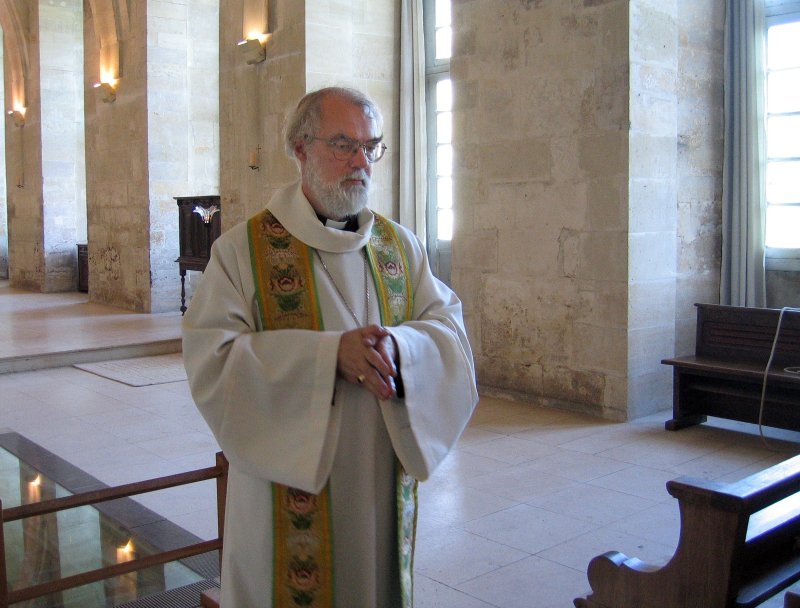
In his video message to commemorate Holocaust Memorial Day, the Archbishop urges us to speak on ‘behalf of the neighbour and on behalf of stranger’ as part of this year’s theme of Speak Up, Speak Out:
‘Holocaust Memorial Day brings back to our minds the appalling consequences of a situation where people don’t speak for the neighbour and don’t speak for the stranger; where people are only concerned about their own security, their own comfort zones.’
He goes on to say ‘in our commemoration this year we are encouraged to challenge ourselves: who do we speak for? Are we willing to speak for the neighbour and for the stranger, for people like us and also people who are not like us? Are we willing to take risks alongside one another?’
Archbishop Rowan describes how, during a recent visit to Congo, he spoke with people about their experience of living through genocide:
‘I heard there something of the experience of people who have lived through genocide of another kind – people who didn’t know and couldn’t rely on the fact that there were others to speak for them. And yet there were some; there were signs of hope, and even the slightest difference in the middle of such a catastrophic situation is of the greatest importance - a sign of grace, a sign of God.’
In commemorating the 70th anniversary of the foundation of the Council of Christians and Jews - the UK's oldest national Jewish/Christian interfaith organisation - Dr Rowan Williams cites one of the founders, Archbishop William Temple, who had ‘come to the conclusion that he had to learn to speak for a stranger’. In 1943, Archbishop William Temple argued in the House of Lords that the West should combat the atrocities against Jews in Nazi Germany, he also argued that Jews should be given sanctuary as refugees in the UK due to their persecution during the Holocaust.
Looking ahead to the witness that will be taken forward into the next generation, the Archbishop expresses his hope that the ‘several decades of intense friendship and relationship building’ shown by CCJ will continue to develop.
‘Our words may not be very loud, they may not instantly change everything, but they will change something: they will change us, they will change at least one neighbour - they will make some strangers into neighbours. And that is profoundly and eternally worth doing.’
The full text of the Archbishop’s video message is below:
Sometimes we think and we speak as if we were given our powers of speech primarily to speak for ourselves, to express our feelings or to express our personalities, as we say. But what if speech were really given to us so that we can speak out of a sense of solidarity and community? What if the great miracle were the ability to speak on behalf of the neighbour and on behalf of the stranger?
This year’s Holocaust Memorial Day puts that question to us very seriously, very earnestly. It invites us to think back to those words of Martin Niemöller: the question “if I don’t speak for others, who is there to speak for me?” Holocaust Memorial Day brings back to our minds the appalling consequences of a situation where people don’t speak for the neighbour and don’t speak for the stranger; where people are concerned about their own security, their own comfort zones. And when we look back on the tragic history of the 30s and 40s, one of the things that prevents it just being a totally dark night is the presence of some of those who were willing to speak for strangers and to take risks alongside strangers.
Last year I visited Central Africa and spent a bit of time in Congo. I heard there something of the experience of people who have lived through genocide of another kind – people who didn’t know and couldn’t rely on the fact that there were others to speak for them. And yet there were some; there were signs of hope, and even the slightest difference in the middle of such a catastrophic situation is of the greatest importance - a sign of grace, a sign of God.
So in our commemoration this year we are encouraged to challenge ourselves: who do we speak for? Are we willing to speak for the neighbour and for the stranger, for people like us and also people who are not like us? Are we willing to take risks alongside one another?
We’ve been commemorating recently the 70th anniversary of the foundation of the Council of Christians and Jews in this country, and that has its origins in a moment when one of my own predecessors, Archbishop William Temple, came to the conclusion that he had to learn to speak for a stranger. Out of that has come several decades of intense friendship building, relationship building and witness to our wider society. I very much hope that that witness will be part of what we take forward into the next generation; a generation where these issues will not be stale and they will not be academic, and where we will go on being challenged as to who we speak for. Our words may not be very loud, they may not instantly change everything, but they will change something: they will change us, they will change at least one neighbour - they will make some strangers into neighbours. And that is profoundly and eternally worth doing.
